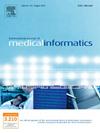人工智能对心脏病学心电图影响的系统回顾。
IF 3.7
2区 医学
Q2 COMPUTER SCIENCE, INFORMATION SYSTEMS
International Journal of Medical Informatics
Pub Date : 2024-12-09
DOI:10.1016/j.ijmedinf.2024.105753
引用次数: 0
摘要
背景:人工智能(AI)为众多行业带来了变革,提高了效率、可扩展性和洞察力。在心脏病学领域,尤其是通过心电图(ECG)分析,人工智能有可能提高诊断准确性并缩短诊断所需时间。本系统性综述探讨了人工智能、机器学习(ML)和深度学习(DL)在心电图分析中的整合,重点关注它们对心脏病学中预测性诊断和治疗支持的影响:按照 PRISMA 2020 框架进行了系统性文献综述,使用四个高影响力数据库来识别 2014 年至 2024 年的研究。纳入标准包括英语期刊论文和研究论文,重点关注人工智能在心脏病学中的应用,特别是心电图分析。对记录进行筛选,剔除重复内容,并根据其与人工智能-心电图整合用于心脏健康的相关性进行最终筛选:综述包括 46 项符合纳入标准的研究,涵盖各种人工智能模型,如 CNN、RNN 和混合模型。这些模型被应用于心电图数据,以检测和预测心律失常、心肌梗死和心力衰竭等心脏状况。这些研究结果表明,人工智能驱动的心电图分析提高了诊断准确性,为早期诊断和个性化治疗提供了重要支持:结论:人工智能技术,尤其是 ML 和 DL,通过提高准确性、缩短诊断时间、支持及时干预和个性化治疗,提高了基于心电图的心脏病诊断水平。该领域的持续研究对于完善算法和将人工智能工具融入临床实践以改善心脏病学患者的预后至关重要。本文章由计算机程序翻译,如有差异,请以英文原文为准。
A systematic review on the impact of artificial intelligence on electrocardiograms in cardiology
Background
Artificial intelligence (AI) has revolutionized numerous industries, enhancing efficiency, scalability, and insight generation. In cardiology, particularly through electrocardiogram (ECG) analysis, AI has the potential to improve diagnostic accuracy and reduce the time needed for diagnosis. This systematic review explores the integration of AI, machine learning (ML), and deep learning (DL) in ECG analysis, focusing on their impact on predictive diagnostics and treatment support in cardiology.
Methods
A systematic literature review was conducted following the PRISMA 2020 framework, using four high-impact databases to identify studies from 2014 to -2024. The inclusion criteria included English-language journal articles and research papers that focused on AI applications in cardiology, specifically ECG analysis. Records were screened, duplicates were removed, and final selections were made on the basis of their relevance to AI-ECG integration for cardiac health.
Results
The review included 46 studies that met the inclusion criteria, covering diverse AI models such as CNNs, RNNs, and hybrid models. These models were applied to ECG data to detect and predict heart conditions such as arrhythmia, myocardial infarction, and heart failure. These findings indicate that AI-driven ECG analysis improves diagnostic accuracy and provides significant support for early diagnosis and personalized treatment.
Conclusions
AI technologies, especially ML and DL, enhance ECG-based cardiology diagnostics by increasing accuracy, reducing diagnosis time, and supporting timely interventions and personalized care. Continued research in this area is essential to refine algorithms and integrate AI tools into clinical practice for improved patient outcomes in cardiology.
求助全文
通过发布文献求助,成功后即可免费获取论文全文。
去求助
来源期刊

International Journal of Medical Informatics
医学-计算机:信息系统
CiteScore
8.90
自引率
4.10%
发文量
217
审稿时长
42 days
期刊介绍:
International Journal of Medical Informatics provides an international medium for dissemination of original results and interpretative reviews concerning the field of medical informatics. The Journal emphasizes the evaluation of systems in healthcare settings.
The scope of journal covers:
Information systems, including national or international registration systems, hospital information systems, departmental and/or physician''s office systems, document handling systems, electronic medical record systems, standardization, systems integration etc.;
Computer-aided medical decision support systems using heuristic, algorithmic and/or statistical methods as exemplified in decision theory, protocol development, artificial intelligence, etc.
Educational computer based programs pertaining to medical informatics or medicine in general;
Organizational, economic, social, clinical impact, ethical and cost-benefit aspects of IT applications in health care.
 求助内容:
求助内容: 应助结果提醒方式:
应助结果提醒方式:


